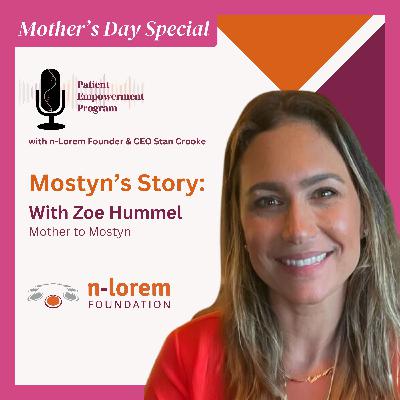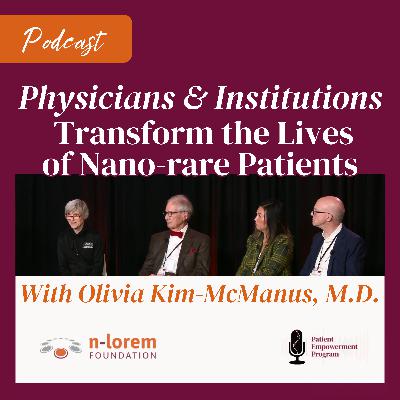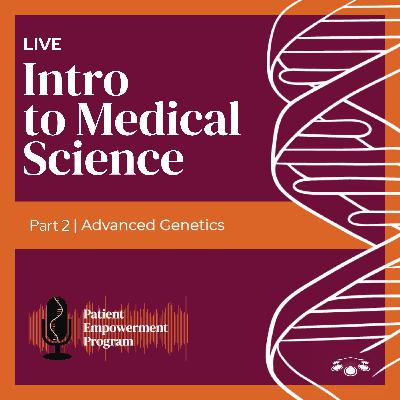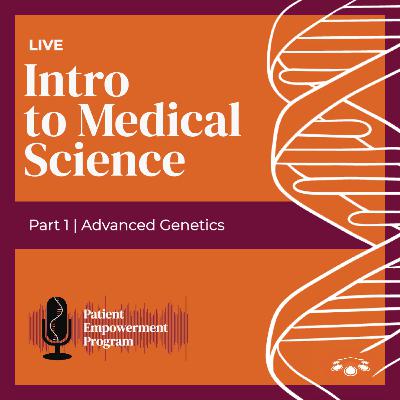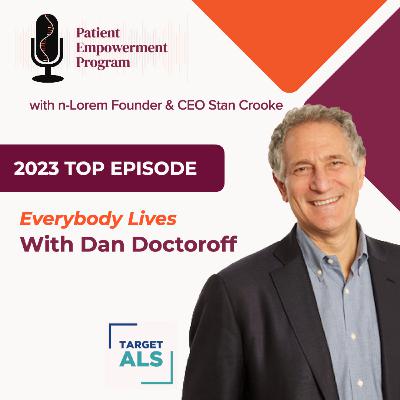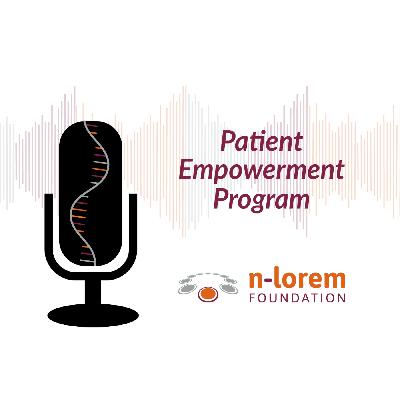Discover Patient Empowerment Program: A Rare Disease Podcast
Patient Empowerment Program: A Rare Disease Podcast

Patient Empowerment Program: A Rare Disease Podcast
Author: n-Lorem Foundation
Subscribed: 4Played: 54Subscribe
Share
© Copyright 2024 n-Lorem Foundation
Description
Join the nano-rare disease community! Interviews features leading physicians, scientists, biotech experts, and patient advocates. Lessons teach core concepts about drugs. Our host Dr. Crooke has led the creation of antisense technology and his foundation, n-Lorem, is using this powerful technology to discover, develop, and provide personalized experimental antisense oligonucleotide medicines to nano-rare patients for free, for life.
n-Lorem is a non-profit organization established to apply the efficiency, versatility and specificity of antisense technology to charitably provide experimental antisense oligonucleotide (ASO) medicines to treat patients (less than 30 patients) that are the result of a single genetic defect unique to only one or very few individuals. The advantage of experimental ASO medicines is that they can be developed rapidly, inexpensively and are highly specific. n-Lorem was founded by Dr. Stan Crooke, who founded IONIS Pharmaceuticals in 1989 and, through his vision and leadership, established the company as the leader in RNA-targeted therapeutics.
This podcast is produced by n-Lorem Foundation and hosted by Dr. Stanley T. Crooke, who is our Founder, CEO and Chairman. Our videographer is Jon Magnuson. Our producers are Kira Dineen, Jon Magnuson, Kim Butler, and Amy Williford. To learn more about n-Lorem, visit nlorem.org. Contact us at podcast@nlorem.org.
n-Lorem is a non-profit organization established to apply the efficiency, versatility and specificity of antisense technology to charitably provide experimental antisense oligonucleotide (ASO) medicines to treat patients (less than 30 patients) that are the result of a single genetic defect unique to only one or very few individuals. The advantage of experimental ASO medicines is that they can be developed rapidly, inexpensively and are highly specific. n-Lorem was founded by Dr. Stan Crooke, who founded IONIS Pharmaceuticals in 1989 and, through his vision and leadership, established the company as the leader in RNA-targeted therapeutics.
This podcast is produced by n-Lorem Foundation and hosted by Dr. Stanley T. Crooke, who is our Founder, CEO and Chairman. Our videographer is Jon Magnuson. Our producers are Kira Dineen, Jon Magnuson, Kim Butler, and Amy Williford. To learn more about n-Lorem, visit nlorem.org. Contact us at podcast@nlorem.org.
51 Episodes
Reverse
Motherhood is a journey filled with challenges, but every step is worth it for the love and joy it brings. Zoe Hummel joins the show in this special Mother’s Day episode to discuss her son Mostyn’s emotional story to diagnosis, and the unique challenges and triumphs of being a nano-rare mom.Order your Mother's Day card by May 6, 2024! All proceed support nano-rare patients.On This Episode We Discuss:How Zoe met her Husband, Mostyn’s fatherZoe’s Violin origins and playing with Rod StewartMostyn’s journey to a diagnosisZoe’s advice for parents observing abnormalities in their child's developmentMostyn’s severe epilepsyA road trip to Boston Children’s Hospital in the middle of winterThe ‘unlucky’ diagnosis of KCNB1For-profit companies promising false hope
Research physicians and their associated institutions are monumental to the mission of the n-Lorem Foundation and are truly transformational to the lives of the nano-rare patients they treat. Olivia Kim-McManus, M.D., was one of four physician panelists at our first Colloquium who participated in "A Physician's Perspective on n-Lorem and Nano-rare". Hear Olivia's outlook on nano-rare patients and how the support of an institution like UCSD Rady Children’s Hospital makes all the difference.On This Episode We Discuss:1:55 When Dr. McManus became interested in pediatric neurology and epilepsy 4:00 What ion channels do and why they play a role in epilepsy 5:17 How often is epilepsy genetically caused? 6:52 Why Dr. McManus and Rady Children’s Hospital choose to invest time and resources in helping nano-rare patients. 11:50 Bringing people together for a single forum at the Nano-rare Patient Colloquium inspires collaboration between groups 14:43 The importance of a network of treating physicians and institutions and sharing experiences and lessons learned 17:58 Interest within Rady Children’s Hospital regarding nano-rare patient treatment and ASOs 21:45 A Physician’s Perspective of Nano-rare and n-Lorem
Genetics can be intricate, no doubt. With millions of mutations present in every human, one might wonder why not everyone is impacted by pathogenic diseases. The Patient Empowerment Program aims to assist you in grasping the fundamental concepts of various mutations and how they function, paving the way for you to enhance your understanding of genetics. Delve into the diverse array of disease-causing mutations, their characteristics, and explore which mutations could potentially be addressed through ASO treatment in this concluding episode of Advanced Genetics.On This Episode We Discuss:The nature of a SNPPre-mature-m-RNA effectsIndels can disrupt the reading frameDefining Alleles, Homozygous, Heterozygous, and Compound HeterozygousThe difference between whole exome and genome sequencingHow we, at n-Lorem, decide which patients are amendable to ASO treatmentsHow we design ASOs to take advantage of different post-RNA binding mechanismsMechanisms: Non-allele selective RNAse H1, Allele-selective RNAse H1, and Splicing ASOs
Each time one of the cells in your body divides to form a new cell, 3 BILLION genetic letters must be accurately duplicated. That’s a big number and mistakes DO happen in everyone. That’s right, if you’re reading this, you have a genetic mutation.On This Episode We Discuss:Your genetic alphabet – nucleotidesHow to think about DNA ReplicationTypes of mutationsWhat is an SNP and why you should careIndelsThe genetic codeHow genetic information is translated into a protein
What's one way to spread hope? By sharing your experiences and connecting with others who truly understand the everyday challenges nano-rare patients face. Shanna Tolbert was one of five nano-rare patient caregivers who participated in the panel, The Perilous Journey to Diagnosis and Treatment for Nano-rare Disease Patients. Listen to Shanna’s take on the importance of dialogue and relive a few patient stories as told by the parents who participated in this panel.On this episode, we discuss:0:56 The importance of hope3:38 Meeting other nano-rare caregivers and staying connected6:48 The Nano-rare Patient Colloquium is intimate 12:41 Patients in attendance are one of the joys of the NRPC16:35 Patient Journey - Connor20:55 Patient Journey - Mostyn25:27 Patient Journey - Lena32:32 Patient Journey - Ireland39:29 Comments from patient father, Luke RosenVideo: Susannah's Story: Treated with an ASO
For n-Lorem’s Chief Operating Officer, Sarah Glass, the mission of n-Lorem is personal. Her son Ethan was diagnosed with a nano-rare mutation. A geneticist by training, she joined n-Lorem to oversee and direct the organization’s efforts to provide hope and potential help to those who need it most. It's more than just a job for her; she's powered by her son and the entire nano-rare community. 1:20 Sarah’s background, early life, and scientific interests 7:20 Thinking about the patient experience while at a Contract Research Organization 8:43 Rare disease trails are relatively new 10:54 Sarah’s son, Ethan, is a nano-rare patient 16:15 How long it took for Ethan to receive a diagnosis 21:35 Ethan's diagnosis and symptoms25:55 How Sarah heard about n-Lorem29:30 How does one come to terms with caring for a nano-rare child; How do parents continue looking for opportunities of hope when they may feel hopeless32:58 What Sarah has learned while at n-Lorem36:48 The biggest surprises Sarah has encountered during her journey at n-Lorem
Charissa Lipman joins n-Lorem founder and CEO, and host of the Patient Empowerment Program Podcast, Dr. Stan Crooke, in this question-and-answer episode to discuss additional questions asked during the 2023 Nano-rare Patient Colloquium. Charissa attended the inaugural Colloquium in October 2023 and brings the perspective of a patient family member, discussing her experiences and takeaways from the meeting. She is the mother of Ryker, a nano-rare n-Lorem patient with a CACNA1A genetic mutation. Stan and Charissa sit down to have a conversation and together address questions from the nano-rare community. Do you have a question you want to ask Stan Crooke? Email podcast@nlorem.org for a chance to be featured in a future episode. For general questions, email info@nlorem.org.In this episode we answer:08:25 As you are successful in discovering and developing individualized ASO for nano-rare patients, do you envision creating a library of ASOs that would be available to patients across the world?10:29 For disease organization/patient advocacy groups that have several patients with the same mutation, should they apply for treatment as a group or separately?13:16 Would an ASO developed for one patient work for another patient with a mutation in the same gene?14:29 What's a SNP?16:19 As a nano-rare family member, I have never been so inspired in an opening address as what was provided at the 2023 colloquium by Stan Crooke. Given the mission of n-Lorem, I don’t understand how any researching neurologist (or any researcher in the space) would not want to be at the absolute forefront of what n-Lorem is doing. Why do you think there is such an obstacle to being a part of an organization that has for the first time an opportunity to move the needle in such a meaningful way?20:16 How would you describe the relationship between n-Lorem and the research physician, and what should patients expect from each side?23:44 What do you mean by an optimized ASO?24:59 Would you expect to see better results from ASO treatment in patients who are younger versus older?28:10 The FDA has certain designations for program review (Fast Track, Orphan, etc,), is there anything like that for nano-rare patients?29:35 I realize that there was significant work done in 2023 to streamline n-Lorem’s operations. Which processes in the workflow do you believe can still be optimized to help streamline patient programs?31:35 Has there been a change in the amount of time it takes to process a patient and develop and ASO...
We're diving into the archives to resurface this top downloaded episode from last year. Dan Doctoroff joined Patient Empowerment Program in February 2023 to talk about his mission to support a world where everyone with ALS lives. Dan is the former NYC deputy mayor for economics and former CEO of both Bloomberg L.P. and Sidewalk Labs. In this episode, Dan discusses his family’s battle with amyotrophic lateral sclerosis (ALS), his own inspiring story of how his diagnosis completely changed his outlook on life and his work with the foundation he started, Target ALS.
For the return of the patient empowerment program podcast, we’re recapping the 2023 Nano-rare Patient Colloquium in this special “Best of” episode. For the Colloquium, we gathered the nano-rare community under one single roof for a full day of presentations and panels with experts, partners, supporters, and patients. So, we are bringing some of the top moments directly to your speakers. Discover the origins and aspirations of n-Lorem and Columbia University's Silence ALS initiative, visualize the journey of a nano-rare patient with an emotional story told by a loved one, and imagine a future where commercial drug discovery organizations can focus on the world’s rarest diseases and more all in this one episode. To access the entire event, click here.
Nano-rare diseases strip power from families and this often leads to hopelessness, anger, and dread. However, channeling these intense emotions to carefully navigate risk/benefit decisions is within one’s control.n-Lorem is different than standard drug development settings. Every risk/benefit decision that n-Lorem makes is in the context of the individual patient’s symptoms, status, and needs. While we cannot promise benefit, we can promise that we will do our very best in the creation of an optimal medicine.On This Episode We Discuss:Risk/benefit decisionsn-Lorem is differentWe cannot make promisesCommunicating about riskPerceptions concerning controlExposure and riskCompressionOmissionTimingOfficial positions affect our perceptionsAnchoring and communicating risk
“How to Think About Risk” is arguably the most crucial topic ever discussed on the Patient Empowerment Program. Navigating decisions with substantial risk can be challenging, intricate, and even intimidating. The ability to detach from the intense emotions surrounding these choices is critical for making the best and most logical decisions.On This Episode We Discuss:Why nano-rare patients and their families need to think effectively about riskRisk vignettes: infectious diseases, automobile and smoking deathsA rational way to think about riskBeing comfortable with a probabilistic realityThe 80/20 ruleConsidering consequencesThe process to assess riskGetting serious about risk/benefit evaluationsRisk/benefit judgements
Jeff Carroll, Ph.D., inherited a gene that will eventually lead to symptoms of Huntington’s Disease. Alongside researching this debilitating disease as an Associate Professor of Neurology at the University of Washington, he’s a Scientific Advisor for n-Lorem and member of the Access to Treatment Committee (ATTC) that helps screen and assess submitted patient applications.On This Episode We Discuss:2:45 Joining the Amy on a whim 4:30 Serving in Kosovo and Germany6:00 Learning that his mother was diagnosed with Huntington’s disease (HD)10:25 Seeking information and diving into the world of Biology and HD14:52 Deciding to have children when there was a chance that they’d inherit the disease and utilizing preimplantation genetic diagnosis (PGD)18:30 Watching Ionis make initial progress on an ASO for Huntington’s disease23:10 How Jeff became involved with n-Lorem27:30 Most important things Jeff has learned during his role at n-Lorem30:38 Helping people is motivating32:11 Nano-rare patients teach us a lot about science33:57 Jeff expects to receive an ASO treatment one day35:22 n-Lorem is on your side
Chip Wilson, the creator of Lululemon and SOLVE FSHD, stands as a pioneer, business innovator, philanthropist, and a person affected by a rare disease. His passion for fitness led him to build a successful career in designing athletic wear, but a diagnosis of Facioscapulohumeral Muscular Dystrophy (FSHD), a degenerative muscle condition, altered his active lifestyle.On This Episode We Discuss:0:46 Working on the Alaska Oil Pipeline as a 17-year-old4:30 Saving money young and becoming an entrepreneur7:05 Following trends and founding Lululemon8:36 Chip’s initial dream and vision for Lululemon11:45 Combining Italian design ethics with quality western fabrics for an amazing Lulu product 14:20 The feeling of leaving the Lululemon Board of Directors 17:00 The takeaways from Joseph Heller’s Catch 22 and Something Happened 24:15 Reading the top 100 biographies and admiring those with integrity 33:44 Using the culture of an organization and leadership as a strategic advantage 38:18 Facioscapulohumeral muscular dystrophy (FSHD) 40:05 Chip on losing muscle when exercise and movement is so necessary for his way of life 44:27 Climbing Mount Kilimanjaro with FSHD 46:58 Chip’s advice to those suffering from rare diseases and their caregivers 49:24 What progress that has been made to find a treatment for FSHD 52:35 Why Chip and SOLVE FSHD donated to help fund the funded the laboratory at n-Lorem
The Autonomic Nervous System automatically controls essential processes whether you’re awake or asleep. It’s the employee of the month. It gets the job done at any time of the day without you even having to ask it. It is our body’s autopilot system, controlling functions we often take for granted, like heart rate, digestion, pupil dilation, and even breathing! Life would be pretty hard on manual.On This Episode We Discuss:“I Sing The Body Electric”Hemo and chemo-electric machinesThe nervous systemsAutonomic nervous system manages many organs and involuntary functionsSympathetic and parasympathetic nerves
Dr. Daniel Curran leads Takeda’s efforts to unlock innovation and deliver transformative medicines in a variety of rare-disease areas. Dan embraces learning from, collaborating with, and meeting members of the rare disease community in an effort to produce treatments that result in better health and a brighter future for rare.2:02 How rare disease is defined at Takeda4:10 Rare disease units at Takeda5:23 How Takeda economically justifies half of their pipeline being rare disease drugs9:06 The price of rare disease drugs is too high12:15 Why rare disease efforts are often associated with hematology14:57 What Dr. Curran enjoys about leading Takeda's rare genetics and hematology therapeutic unit16:42 Dr. Curran's professional journey20:50 Takeda's choice to support n-Lorem
As the first ever Nano-rare Patient Colloquium is just around the corner, we are flipping the script. Spectrum News’ Brady Huggett interviews n-Lorem founder and CEO, Dr. Stan Crooke, and picks his mind to understand the inspiration behind the creation and want for this first of its kind nano-rare community event. Along with some background information on the highly anticipated Colloquium, Stan candidly conveys n-Lorem's hurdles and joys in its first four years of service.
Liver disease is a broad term encompassing a range of conditions that affect the liver's structure and function. The liver is extremely important as it wears many different hats when it comes to your body functioning properly like controlling metabolism, storing and breaking down nutrients for use, detoxification and more! No wonder there are many diseases associated with liver disfunction including various genetic ones. Get ready to explore... you guessed it, various diseases of the liver! On this episode we discuss:Controlling inflammatory processesLiver failureGenetic disease pathwaysDrug metabolismFatty liverBlood tests signal liver disfunction
The liver is a master chemist that sends copious signals to help control our appetite and breaks down fats to be stored and used as energy and to combat starvation. Next time you’re hangry, think of your liver kicking into overdrive.On This Episode We Discuss:Producing countless small chemical metabolitesControlling iron homeostasisThe liver and the gut microbiomeCombatting starvation and triggering appetiteManaging glucose levels
The liver has many important and magical metabolic functions. It converts the nutrients in our diets into substances that the body can use and filters toxic substances out from the body. You won't believe the sheer metabolic mayhem that happens behind the scenes!
Argonaut Manufacturing Services Inc. CEO, Wayne Woodard, joins the Patient Empowerment Program to detail how Argonaut bottles vials of hope for n-Lorem patients. Argonaut is n-Lorem's provider of Sterile Fill-Finish for an optimal ASO. This means that the lyophilized ASO powder, which was manufactured with good manufacturing practices (GMP), gets formulated and aliquoted into sterile vials. The final product is tested for various attributes to ensure maximal quality. Once assessed and approved, the finished product is then ready to be administered to a nano-rare patient by a qualified research physician at an established institution.


